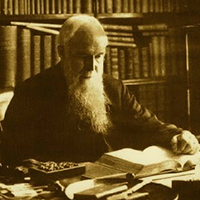 J.C. Ryle: “The Word Became Flesh”
J.C. Ryle: “The Word Became Flesh”
The main truth which this verse (John 1:14) teaches is the reality of our Lord Jesus Christ’s incarnation, or being made man. John tells us that “the Word was made flesh, and dwelt among us.”
The plain meaning of these words is that our divine Savior really took human nature upon Him in order to save sinners. He really became a man like ourselves in all things, sin only excepted. Like ourselves, he was born of a woman, though born in a miraculous manner. Like ourselves, He grew from infancy to boyhood, and from boyhood to man’s estate, both in wisdom and in stature (Luke 2:52). Like ourselves, he hungered, thirsted, ate, drank, slept, was wearied, felt pain, wept, rejoiced, marveled, was moved to anger and compassion. Having become flesh, and taken a body, He prayed, read the Scriptures, suffered being tempted, and submitted His human will to the will of God the Father. And finally, in the same body, He really suffered and shed His blood, really died, was really buried, really rose again, and really ascended up into heaven. And yet all this time He was God as well as man!
But while we do not pretend to explain the union of two natures in our Lord Jesus Christ’s Person, we must not hesitate to fence the subject with well-defined cautions. While we state most carefully what we do believe, we must not shrink from declaring boldly what we do not believe. We must never forget, that though our Lord was God and man at the same time, the divine and human natures in Him were never confounded. One nature did not swallow up the other. The two natures remained perfect and distinct. The divinity of Christ was never for a moment laid aside, although veiled. Though perfect God, Christ has always been perfect man from the first moment of His incarnation. He who is gone into heaven, and is sitting at the Father’s right hand to intercede for sinners, is man as well as God. Though perfect man, Christ never ceased to be perfect God. He that suffered for sin on the cross, and was made sin for us, was “God manifest in the flesh.” The blood with which the Church was purchased, is called the blood “of God” (Acts 20:28). Though He became “flesh” in the fullest sense, when He was born of the Virgin Mary, He never at any period ceased to be the Eternal Word.
This constant undivided union of two perfect natures in Christ’s Person is exactly that which gives infinite value to His mediation, and qualifies Him to be the very Mediator that sinners need. Our Mediator is One who can sympathize with us, because He is very MAN. And yet, at the same time, He is One who can deal with the Father for us on equal terms, because He is very GOD. It is the same union which gives infinite value to His righteousness, when imputed to believers. It is the righteousness of One who was God as well as man. It is the same union which gives infinite value to the atoning blood which He shed for sinners on the cross. It is the blood of One who was God as well as man. It is the same union which gives infinite value to His resurrection. When He rose again, as the Head of the body of believers, He rose not as a mere man, but as God. Let these things sink deeply into our hearts. The second Adam is far greater than the first Adam was. The first Adam was only man, and so he fell. The second Adam was God as well as man, and so He completely conquered.
Did the Word become flesh? Then He is One who can be touched with the feeling of His people’s infirmities, because He has suffered Himself, being tempted. He is almighty because He is God, and yet He can sympathize with us, because He is man.
Did the Word become flesh? Then He can supply us with a perfect pattern and example for our daily life. Had he walked among us as an angel or a spirit, we could never have copied Him. But having dwelt among us as a man, we know that the true standard of holiness is to “walk even as He walked” (1 John 2:6). He is a perfect pattern, because He is God. But He is also a pattern exactly suited to our needs, because He is man.
Finally, did the Word become flesh? Then let us see in our mortal bodies a real, true dignity, and not defile them by sin. Vile and weak as our body may seem, it is a body which the Eternal Son of God was not ashamed to take upon Himself, and to take up to heaven. That simple fact is a pledge that He will raise our bodies at the last day, and glorify them together with His own.
~ From Expository Thoughts on the Gospel of John


